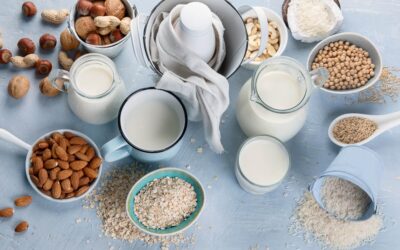Like most American kids, my parents served me cow’s milk every morning with my cereal, believing it was good for me and a necessity for my health. I was also influenced by plenty of television commercials, which told me that I needed cow’s milk to build strong bones. The idea of cow’s milk as a health food was further solidified by my school, which sold cartons of cow’s milk in the cafeteria every day. If my parents, the sponsored athletes and celebrities on TV, and my school were saying dairy is good for me, it must be, right? Not quite.
Cow’s milk has long been established as a healthy beverage for growing children after the age of one. The dairy industry and several governmental organizations have an intricate history of advocating for dairy consumption, never wavering from their message: cow’s milk is essential to meet nutrient needs and to build strong bones in children (and adults as well). With the dairy industry’s powerful advertising presence, we have come to believe and live by this claim, funneling glass upon glass of cow’s milk into our kids. But studies have shown that cow’s milk has no place in our diet and may actually lead to harmful effects in children if consumed regularly.
As a new mother to a four-month-old little girl, I know that the health of their children is a parent’s top priority. I understand that parents want to provide the best possible nutrition so that children grow up with healthy eating habits. But cow’s milk should not be a part of a healthy eating routine. The kid-friendly dairy beverages and yogurts are simply industry propaganda, and there are kinder, dairy-free alternatives that meet all children’s nutritional needs without any potentially harmful side effects.
Before we dive into what dairy-free alternatives are appropriate for children, let’s first talk about some of these side effects that children may experience by consuming dairy.
Cow’s Milk Protein Allergies in Children
About 2.5% of children under the age of three in the US are allergic to cow’s milk protein, with the highest prevalence happening in the first year of age (1,2). An allergy occurs when the body’s immune system reacts unusually to proteins by attacking them. In this case, when the body is introduced to the proteins from cow’s milk, the body registers them as foreign products and tells us via an allergic reaction. Many children outgrow this allergy, but children with high levels of cow’s milk antibodies in their blood continue to be allergic to cow’s milk well after infancy (2). The most common symptoms of a cow’s milk allergy are rashes, stomach upset, vomiting, and/or diarrhea. More serious reactions that may occur over time include poor growth, skin problems, iron deficiency anemia, colic, and possible protein loss (1,3). Infants may also become allergic if provided infant formula made with cow’s milk (typically from whey protein) and/or from their mother’s breast milk if she consumes dairy products.
Iron Deficiency Anemia with Dairy Consumption
Studies have shown that children who consume cow’s milk are at greater risk of developing iron deficiency anemia (4). There are several reasons for why this may occur:
- Cow’s milk is a poor source of iron and it has low bioavailability (meaning the body cannot absorb this iron well) and children who consume cow’s milk regularly have been shown to have an increased risk of anemia (4).
- Cow’s milk also has high levels of calcium and phosphorus, both which inhibit the absorption of iron and could potentially explain why children experience anemia.
- Children who experience gastrointestinal issues as a result of inflammation from consuming cow’s milk may experience chronic diarrhea and blood loss, which leads to loss of iron (3).
The earlier a child is introduced to cow’s milk, the greater the risk a child has of developing anemia.
Cow’s Milk Allergy Changes Overall Gut Microbes
Several studies have also shown that children with a cow’s milk allergy differ in their gut microbes than children without the allergy. Those with a cow’s milk allergy have a lower diversity in their gut microbes. This is concerning because emerging research has found that having a diverse gut microbe actually benefits long-term health. Many bacteria that live in our gut are actually helpful because they play a role in maintaining a healthy immune system and preventing diseases induced by inflammation (i.e. obesity).
Quality Nondairy Alternatives for Infants and Children
There are many safe and healthy nondairy alternatives that infants and children can consume. Infants should only be provided either breast milk and/or soy-based infant formula to ensure they are receiving adequate nutrition for growth. After the age of one, full-fat fortified unsweetened soy milk is recommended. Toddlers 1-3 years of age should receive at least 3 servings (1 cup of fortified soy milk = 1 serving).
Soy beverage is the best dairy-free alternative for children because it provides the appropriate ratio of fat, protein, and carbohydrates that children need during periods of growth. When selecting a soy beverage, it’s important to ensure that it is fortified with Vitamin D, Vitamin B12, and Calcium. Simply take a look at the Nutrition Facts label to ensure that these are listed.
You may be concerned about providing a soy beverage to your children as soy continues to be a controversial topic. Soy contains isoflavones, which are considered estrogen-like hormones, but there is currently no evidence that isoflavones have any adverse effect in children (or most adults, for that matter). If anything, introducing children to soy at a young age actually benefits them by reducing their risk of developing certain types of cancers later in life.
Children should not be provided beverages with labels reading ‘reduced fat’ or ‘low-fat’ as they do not provide adequate calories for proper growth. Beverages such as almond, coconut, or rice milk are not recommended as they do not provide adequate amounts of protein for children. Homemade nondairy beverages are also not recommended as a one-for-one cow’s milk swap, as they are not fortified with essential nutrients that children need, such as calcium, Vitamin D, Iron, and Vitamin B12. Of course, there are other nondairy plant-based food sources that do provide these nutrients, such as tahini, most dark leafy greens, and fortified cereals.
Take Home Message
As Americans, we have been told to drink cow’s milk to maintain our health, to build stronger bones, and to meet our essential vitamin needs. Sometimes it can be hard to go against these messages because they come from sources we may trust; however, we need to reevaluate and take a proper look at this blind faith in the dairy industry. There are healthier, kinder beverage alternatives that can provide proper nutrition to children. For a full list of kid-approved dairy-free alternatives, click here.
I currently follow a vegan lifestyle and raising my little girl on a plant-based diet has never been a question. Exposing her to cow’s milk would not only go against my ethical values but also against her health. There really is no need for cow’s milk in our diet since plant-based foods can offer the same and better nutrition. My daughter is currently exclusively breastfed and I plan to introduce plant-based foods to her once she turns 6 months, adding fortified unsweetened soy beverage by the time she turns one year old. If I can follow this plan, I know you can too.
Written by:
Karla Moreno-Bryce, MDA, RD, LD
Registered Dietitian
[email protected]
www.nutritiousvida.com
References:
- Caffarelli, C., Baldi, F., Bendandi, B., Calzone, L., Marani, M., Pasquinelli, P., EWGPAG (2010). Cow’s milk protein allergy in children: a practical guide. Italian journal of pediatrics, 36, 5. doi:10.1186/1824-7288-36-5
- Food Allergy Research & Education. (n.d.). Milk Allergy. Retrieved from Food Allergy Research & Education: https://www.foodallergy.org/common-allergens/milk
- Lai, F.-P., & Yang, Y.-J. (2018). The prevalence and characteristics of cow’s milk protein allergy in infants and young children with iron deficiency anemia. Pediatrics and Neonatology, 59, 48-52. Retrieved from https://www.pediatr-neonatol.com/article/S1875-9572(17)30386-8/pdf
- Oliveira, M., & Osorio, M. (2005). Cow’s milk consumption and iron deficiency anemia in children. J Pediatr (Rio J), 81, 361-367. Retrieved from http://www.scielo.br/pdf/jped/v81n5/en_v81n5a04.pdf








